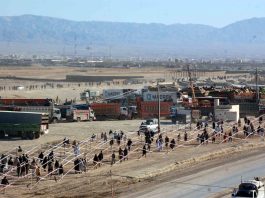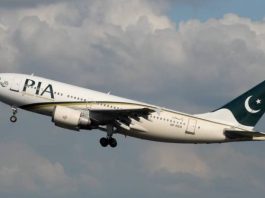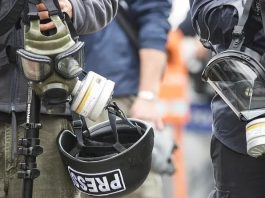
Lahore: Following the horrific attack on Army Public School Peshawar, the government is seriously thinking about writing down code of ethics for media in order to discourage airtime for terrorist activities but media and human rights activists are skeptical about the government’s bid.
In a press conference a few days after the attack, Interior minister Nisar Ali Khan had said that government was working on a code of ethics for media. In this way, the terrorists will not be able to get any kind of coverage to publicize their agenda or terrorize people by their brutal killings.
On 18th Dec 2014, All Parties Conference chaired by Prime Minister Nawaz Sharif was held in Islamabad that resulted in a National Action Plan. Reciprocal understanding and twenty points were established in that conference one of which bounds media from not promoting terrorist activities.
Some media persons and human rights activists have articulated apprehensions on this sketch and deem it against necessary human rights.
Asma Jahangir, a distinguished human rights activist while talking to News Lens Pakistan considers this plan as an attempt to restrain media’s independence. “You have no right to confine any information from public. This step is being taken because government isn’t getting successful to batter terrorism so the easier tread is to make public unaware from what is happening around. In addition, after taking charge on media, non-governmental organizations will be their next target. This is unconstitutional that government thinks to put sieve on media.”
Media persons believe that government is still unable to classify among bad and good Taliban or that who should be considered as a terrorist. Saleem Safi, a senior journalist, while talking to News Lens Pakistan said, “We don’t know whether we should call Akbar Bugti Balochi a martyr or a terrorist as he was killed in an operation done by Army. Can media endorse Hafiz Saeed, leader of banned organization Jamat Ud Dawa, in news or not?”
“American media gives views of Al Qaida, Nick Robertson interviewed Osama Bin Ladan. On the other hand, Indian Media gives Kashimiri Mujahideen’s version while Taliban get coverage on Afghan Media as well. Aljazeera also gives space to terrorists. Then based on what code of ethics should I not give them airtime on our local media?” he added.
It should also be lucid for media that what types of literature carries sectarianism, ethnicity and anti-state elements. A narrative must be given to public and media regarding these types of organizations, groups and individuals who are involved in such activities. “This is unattainable for media to stop the flow of information. How can you put off international media from publishing or airing terrorists’ version or any news regarding their tumult?” Hamid Mir senior journalist talks to News Lens Pakistan.
He added, “According to internal security policy, 60 organizations are banned by United Nations including Jamat Ud Dawa, AL Akhter Trust and Al Rasheed Trust. Moreover, Sipah Sahaba gets a lot of news coverage in media. Defense Pakistan Council does include banned organizations that carry out processions and public meetings in different parts of the country. Government should be ready to guide media whether to cover these organizations or not? Government’s vague forecast will create solemn damage to media.”
Khawar Naeem Hashmi while talking to News Lens Pakistan said, “We also need government’s clear stance regarding ongoing ethnic movements in Baluchistan and Karachi. Moreover, by implementing this guiding principle, journalists will be more vulnerable to impairment by the terrorists or by banned organizations.”
He further said, “Banned organizations are working freely in this country and government and law enforcing agencies have all kinds of knowledge and information, so what about their activities? If they freely work so how is it possible for media to refuse them? Terrorists like Bait Ullah Mehsood, Mulvi Fazal Ullah and others were our heroes at some point in time. Moreover, Mualana Abdul Aziz still supports Taliban but the state shows no reaction which means there is still no clarity on this issue and political will is absent.”
“General Safdar Hussain made treaty with Naik Muhammad at Shakai in 2004 and with Baitullah Mehsud at Sararogha after giving him half a million dollar to pay back the bribe he took from Al Qaida. General Ali Jan Aurakzai made a treaty with Taliban in North Waziristan and he refused to continue his work as Corps Commander as soon as General Musharaf decided to start operation against Taliban”, Khalid Ahmed senior journalist and thinker tells News Lens Pakistan.
“Who have made treaties with these Taliban or terrorists? Unfortunately, when Taliban leaders died our interior minister Ch Nisar Khan mourned at their death. So, who would decide about terrorist and fundamentalist or anti state actors?” he added.
Information Minister Pervaiz Rasheed while talking to News Lens Pakistan said, “Pakistani State has changed its direction now, fortunately on the right path. People who endeavor to challenge state with gun would be considered as terrorists. Now there is no good or bad Taliban.”
He continued, “Media can bestow space to all those who don’t support militant groups, persons or organizations. Now everybody including media must be clear that anyone who tries to promote killings, war against Pakistan or any other state would be considered as terrorist. Moreover, state shall establish principal or mechanism through Judiciary to remove all kinds of misconceptions and ambiguities. In addition, government will also ensure that live coverage on any operation against terrorists must not be allowed.”



